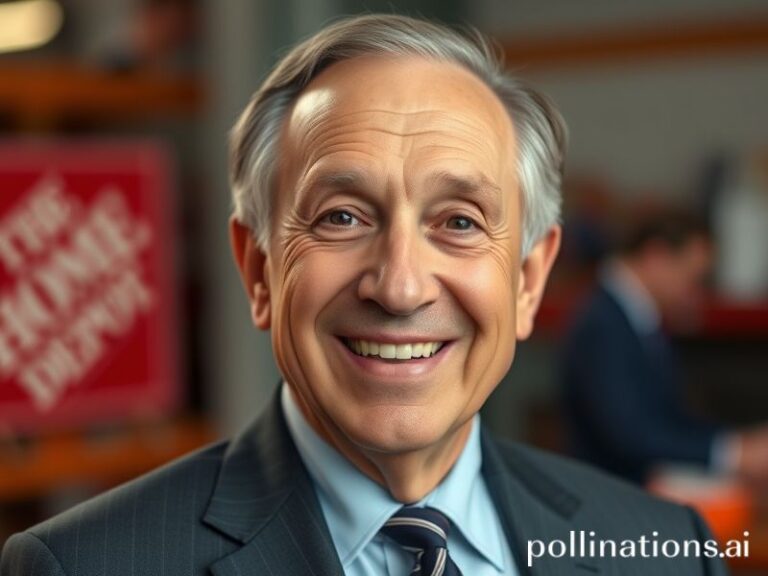amazon prime lawsuit settlement
Amazon’s $8.5 Million Prime Settlement: The World Watches a Subscription Circus Pack Up Its Tent
International Correspondent: Dave’s Locker, Geneva Bureau
The news arrived on a Tuesday—because bad news always prefers Tuesdays, when the coffee’s lukewarm and hope has already filed for bankruptcy. Amazon, the digital colossus that once promised to deliver everything from A to Z even if “Z” was a zebra-print bidet, agreed to pay $8.5 million to settle a U.S. class-action accusing it of duping customers into Prime memberships. America yawned; Europe raised a skeptical eyebrow; the rest of the planet checked to see if the refund would arrive before the next coup d’état.
Let’s zoom out. To the average Norwegian, $8.5 million is roughly what their sovereign wealth fund earns while the finance minister blinks. To a Nigerian small-business owner fighting daily blackouts, it’s a cosmic joke: Amazon’s petty-cash drawer could electrify half of Lagos, yet it’s earmarked for compensating Americans who clicked “Yes” faster than you can say “free shipping.” Meanwhile, in India—where Prime Video is busy bankrolling Bollywood blockbusters that make the Kardashians look understated—consumer-rights lawyers are licking their lips like hyenas at a buffet. The settlement may be U.S.-only, but the jurisprudential aroma drifts across borders on the prevailing winds of litigation envy.
Globally, the case reads like a parable written by Franz Kafka after a three-day mescaline binge. Plaintiffs alleged Amazon used “dark patterns”—digital tripwires so sneaky they’d make a pickpocket blush—to herd users into recurring payments. The company admits no wrongdoing, of course; in corporate speak that’s the adult version of “I didn’t eat the cookies, the cookie jar seduced me.” Still, eight-and-a-half large ones will be sprinkled among affected subscribers, each receiving enough to buy roughly one-tenth of a yearly Prime fee, or as Amazon accountants call it, “a rounding error with a conscience.”
International regulators have taken notes the way teenagers screenshot gossip. The EU’s Digital Services Act, already the legislative equivalent of a stern Swiss headmistress, is sharpening clauses against manipulative interfaces. South Korea’s Fair Trade Commission, never shy about slapping tech titans, issued a press release that translated loosely to “Nice settlement, see you soon.” Even Brazil, distracted as it is by actual rainforests burning, found time to schedule hearings. The settlement is a pebble tossed in Seattle; the ripples are heading for every shore with Wi-Fi.
But the broader significance? It’s a masterclass in modern capitalism’s favorite magic trick: monetize impatience, then charge a convenience fee for regret. We humans—busy, distracted, eager for dopamine—clicked “Join Prime” like lab rats hitting a sugar lever. Amazon simply built a better maze. The settlement is the scientist tossing us a single Cheerio and murmuring, “There, there.” Meanwhile, our data profiles continue to swell like Victorian waistlines, and next-day delivery trucks idle outside, engines humming the song of the Anthropocene.
Irony patrol: the same week Amazon wires its penance, the company announced “Prime Air” drone deliveries in two new countries. Somewhere, an algorithm is calculating how many class-actions it can pre-empt by dropping a $5 gift card from the sky like confetti over a rigged parade. International observers might note that in countries lacking reliable postal codes, the drones will probably deliver the apology before the actual product. Efficiency!
Financial markets barely flinched; Amazon’s stock dipped 0.3 %, a tremor so mild it could be mistaken for a hiccup in an earthquake simulator. Analysts call this “priced in,” which is Wall-Street-ese for “we already assumed you’d misbehave and budgeted accordingly.” Across the Pacific, Alibaba executives toasted the spectacle with lukewarm green tea: “See? Even when they lose, they win.”
So what does the world learn from America’s latest consumer kabuki? First, that “cancel anytime” translates into seventeen clicks, two CAPTCHA puzzles, and a brief existential crisis. Second, every empire—Roman, British, or two-day-shipping—eventually mails a rebate to its disgruntled citizens. And finally, the true global constant isn’t the speed of light; it’s human gullibility, accelerated by one-click purchasing.
As night falls on the digital bazaar, the settlement money trickles into bank accounts already primed for the next impulse buy. Somewhere, an algorithm smiles—if algorithms had lips—and adjusts the price of yoga mats in Uruguay. The circus packs up, only to pitch its tent tomorrow in a timezone near you. Curtain call: same show, new suckers.







